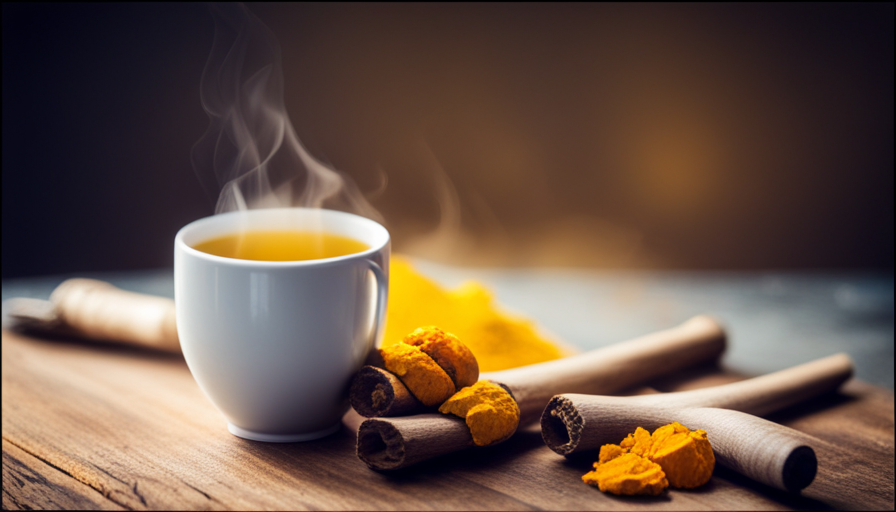Being someone who has battled with high blood pressure for many years, I am consistently searching for natural methods to control my condition. Turmeric tea has become a popular remedy in recent times. This cozy and natural drink is believed to offer numerous health advantages, such as decreasing inflammation and boosting brain activity. However, as an individual with hypertension, I am curious: does turmeric tea elevate blood pressure levels?
In this article, I’ll explore the connection between turmeric tea and blood pressure. I’ll start by explaining what high blood pressure is and why it’s important to manage it. Then, I’ll delve into the health benefits of turmeric tea and whether or not it can actually help with hypertension. Finally, I’ll provide some precautions and recommendations for anyone thinking of incorporating this spice into their diet.
So grab a cup of tea (turmeric or otherwise) and let’s get started!
Key Takeaways
- Turmeric tea contains curcumin, a powerful antioxidant and anti-inflammatory compound that has been found to reduce inflammation, improve brain function, boost immunity, and lower the risk of chronic diseases.
- Consuming turmeric extract for 3 months significantly reduced blood pressure in individuals with metabolic syndrome, and curcumin improved endothelial function and reduced blood pressure in individuals with type 2 diabetes.
- However, individuals with gallbladder problems or gallstones should avoid turmeric tea, and those with a history of kidney stones should refrain from excessive consumption due to the presence of oxalates.
- It is suggested to consume 500-2000mg of turmeric per day, which can be achieved through 1-3 cups of tea depending on strength. It is also important to speak with a healthcare professional before incorporating it into a routine as it can interact with certain medications, particularly blood thinners and diabetes meds.
Understanding High Blood Pressure
Don’t let high blood pressure ruin your health. It’s crucial to understand how it works and what causes it. High blood pressure, also known as hypertension, is a condition where the force of blood against the walls of your arteries is consistently too high. This can lead to serious health problems such as heart attack, stroke, and kidney disease.
Preventing hypertension is important and can be achieved through lifestyle changes. These include exercising regularly, maintaining a healthy weight, reducing salt intake, limiting alcohol consumption, and quitting smoking. These changes can help lower blood pressure and reduce the risk of developing hypertension.
Additionally, managing stress through relaxation techniques like meditation or yoga can also be beneficial in preventing hypertension.
In terms of the health benefits of turmeric tea, this spice has been shown to have anti-inflammatory properties. It may help reduce the risk of certain diseases. However, it is important to understand how turmeric tea may affect blood pressure before consuming it regularly.
The Health Benefits of Turmeric Tea
You can enjoy the health benefits of turmeric tea by adding a spoonful of honey for sweetness and a dash of cinnamon for an extra kick. For example, imagine sipping on a warm mug of turmeric tea with honey and cinnamon while feeling more relaxed and experiencing reduced inflammation in your body.
Turmeric tea has been used for centuries in traditional medicine to treat various ailments, including digestive issues, arthritis, and skin problems. It contains curcumin, a powerful antioxidant and anti-inflammatory compound that has been shown to improve brain function, boost immunity, and lower the risk of chronic diseases such as cancer, diabetes, and heart disease.
To make a delicious cup of turmeric tea, start by boiling water in a pot and adding fresh or ground turmeric root, black pepper, and ginger. Let it simmer for a few minutes to release the flavors and health benefits. Strain the mixture and add honey and cinnamon to taste. You can also experiment with other ingredients such as lemon, mint, or coconut milk for a different flavor profile.
Incorporating turmeric tea into your daily routine can help you reap its many benefits and promote overall health and wellbeing. As we explore the topic of turmeric tea and blood pressure, it’s important to understand the positive impact it can have on our bodies.
Turmeric Tea and Blood Pressure
If one regularly consumes turmeric tea, it may potentially assist in regulating blood pressure levels. Several studies have been conducted to investigate the effects of turmeric on blood pressure management. One study published in the Journal of Nutrition found that consuming turmeric extract for 3 months significantly reduced blood pressure in individuals with metabolic syndrome. Another study published in the American Journal of Hypertension found that curcumin, the active ingredient in turmeric, improved endothelial function and reduced blood pressure in individuals with type 2 diabetes.
To further understand the potential benefits of turmeric tea on blood pressure management, the following table summarizes recent research findings:
| Study | Participants | Results |
|---|---|---|
| Journal of Nutrition | Individuals with metabolic syndrome | Turmeric extract significantly reduced blood pressure |
| American Journal of Hypertension | Individuals with type 2 diabetes | Curcumin improved endothelial function and reduced blood pressure |
While turmeric tea may show promise in regulating blood pressure levels, it is important to note that more research is needed to fully understand its effects. In the next section, we will discuss precautions and recommendations when consuming turmeric tea.
Precautions and Recommendations
Let’s explore some precautions and recommendations to keep in mind when enjoying the potential benefits of turmeric tea. While turmeric tea is generally considered safe to drink, it’s important to be aware of some precautionary measures to avoid any potential adverse effects.
First and foremost, individuals with gallbladder problems or gallstones should avoid turmeric tea as it can exacerbate their condition. Similarly, those with a history of kidney stones should also refrain from consuming excessive amounts of turmeric as it contains oxalates that can contribute to the formation of kidney stones.
In terms of recommended intake, it’s suggested that individuals consume no more than 500-2000mg of turmeric per day. This can be achieved by drinking 1-3 cups of turmeric tea per day, depending on the strength of the tea.
It’s also important to note that turmeric can interact with certain medications, such as blood thinners and diabetes medications, so it’s recommended to speak with a healthcare professional before incorporating turmeric tea into your daily routine.
By following these precautionary measures and recommended intake guidelines, individuals can safely enjoy the potential benefits of turmeric tea.
Frequently Asked Questions
How does turmeric tea taste?
At first, I was hesitant to try turmeric tea because of its strong, earthy taste. However, after discovering its numerous health benefits, I’ve grown to love its unique flavor. Turmeric tea has anti-inflammatory properties and can aid in digestion.
Can turmeric tea be made with milk or other additives?
Yes, turmeric tea can be made with milk alternatives such as almond, soy, or coconut milk. Flavorings like honey or ginger can also be added. It’s a personal preference, but I enjoy mine with almond milk and a touch of cinnamon.
What is the recommended daily intake of turmeric tea?
Drinking turmeric tea daily can provide numerous health benefits, such as reducing inflammation and improving brain function. However, excessive consumption can lead to side effects such as upset stomach and headaches. It’s recommended to consume no more than 1-2 teaspoons of turmeric per day.
Can turmeric tea be consumed by pregnant or breastfeeding women?
As a healthcare professional, I advise pregnant or breastfeeding women to consult with their doctor before consuming turmeric tea. While it has health benefits, safe consumption during pregnancy or lactation is not well established.
Is turmeric tea safe to consume for individuals taking blood thinning medications?
I take blood thinning medication and wondered about potential side effects of consuming turmeric tea. I found that turmeric can interact with certain medications, increasing the risk of bleeding. It’s important to speak with a healthcare provider before consuming turmeric products.
Conclusion
Well, turns out, turmeric tea might actually raise your blood pressure. As someone who loves sipping on this warm and comforting beverage, this news comes as a surprise.
I mean, I always thought turmeric was supposed to be good for your heart health, right? But apparently, there’s conflicting evidence out there and we need to be cautious about how much turmeric tea we consume.
On the bright side, turmeric tea still offers a plethora of health benefits, such as reducing inflammation and aiding in digestion. So, while it may not be the go-to solution for managing high blood pressure, it’s still a great addition to a healthy lifestyle.
It’s important to do our own research and consult with healthcare professionals to determine what works best for our individual health needs. As for me, I’ll still enjoy my turmeric tea, just in moderation.










